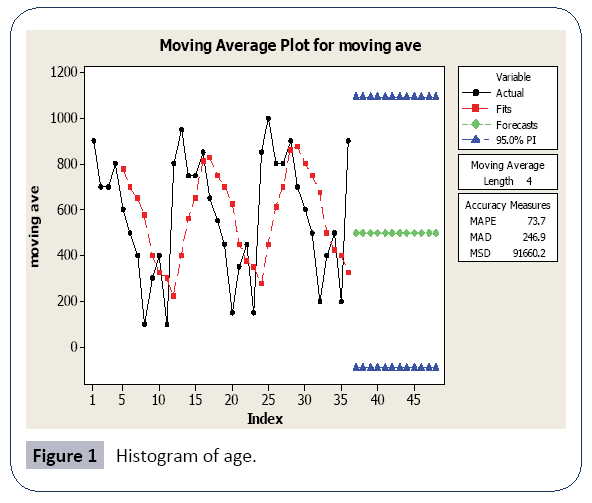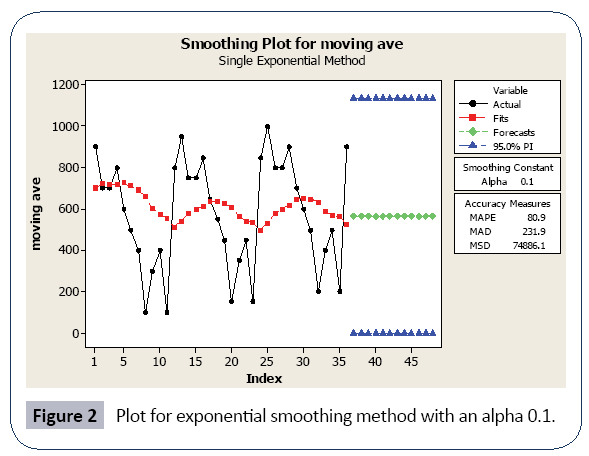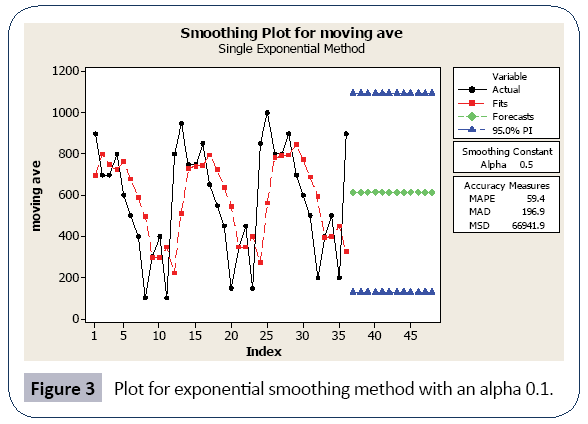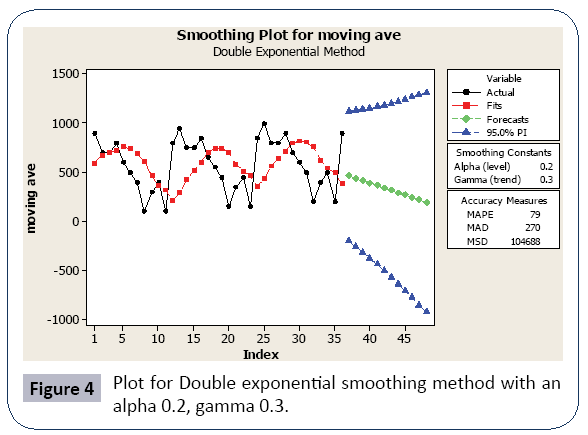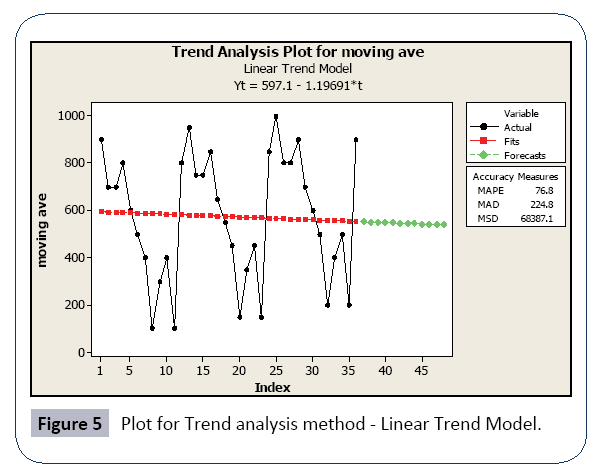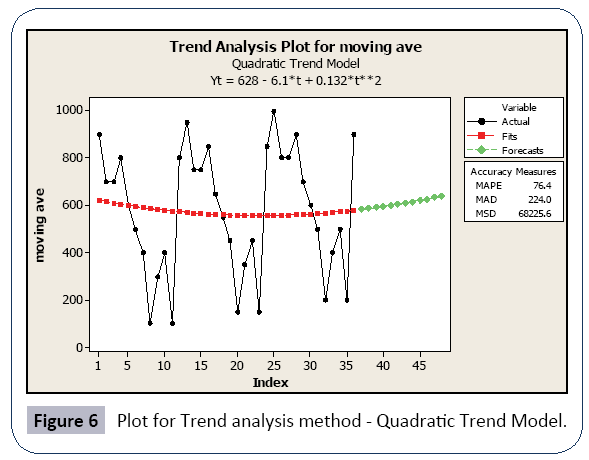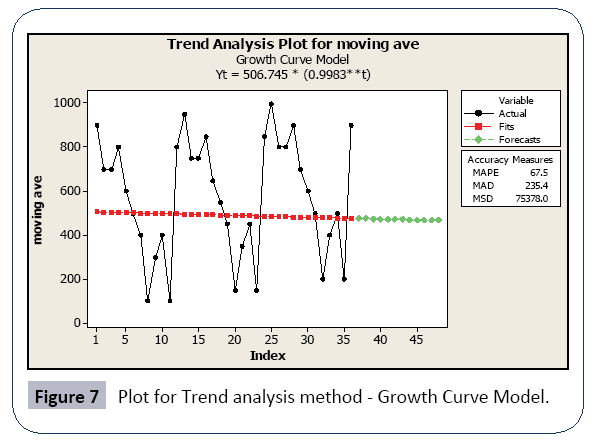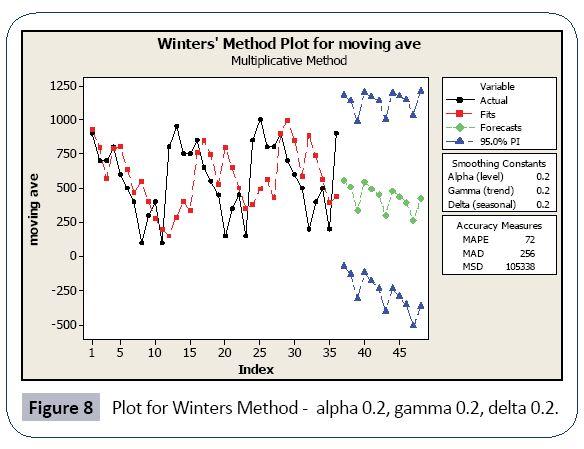Selection of the Forecasting Model in Health Care
ÖZLEM AKÇAY KASAPOĞLU
DOI10.4172/2471-9781.100018
Özlem Akçay KasapoÃÆââ¬Å¾Ãâà ¸lu*
School of Business, Department of Management, Istanbul University, Turkey
- *Corresponding Author:
- Kasapoglu OA
School of Business, Department of Management
Istanbul University, Turkey
Tel: +90 212 440 00 00
E-mail: ozlemak@istanbul.edu.tr
Received date: November 25, 2016; Accepted date: November 02, 2016; Published date: December 02, 2016
Citation: Kasapoglu OA. Selection of the Forecasting Model in Health Care. J Hosp Med Manage. 2016, 2:2.
Abstract
Forecasting is one of the first steps in planning; the success of the plans depends on the accuracy of the forecasts. In the service industries like the hospitals, there are many plans that depend on the forecast, from capacity planning to aggregate planning, from layout decisions to the daily schedules. The accuracy of the forecasts could be determined by the error indicators after the trial of the many methods that fits our data.
Keywords
Forecasting; Error indicators; Hospital Management; Planning
Introduction
Hospital management experience fluctuations in patient volume which may be difficult to predict. Patient volume forecast models might allow hospital managers to prospectively adjust staffing levels. The objective of this paper is to evaluate the predictability of patient beds in obstetric and gynecology department using different forecasting techniques. The analysis methods are done with various time series methods. Patient volume data were collected from a private hospital chain data warehouse from November 2013 to November 2016. Results from different methods were compared by error indicators. Mean absolute percentage error (MAPE), Mean absolute deviation (MAD) and Mean Square Error (MSD) were used to measure the accuracy of the forecasts. Bed requirements for the obstetric and gynecology departments reflect the relationship between the price of the operations and the number of beds available in the private hospitals. Pregnant women consider the success of the doctors in the hospitals but more on the treatment to the mother and the baby after giving birth. Women are worried and looking for comfort after the birth, in feeding the baby, learning about breastfeeding after she is awake and out of the operating room and they prefer more the private hospitals in Turkey if they can afford it.
Around the globe, caesarean section rates have increased dramatically, something that has proven controversial as a large amount of them are not medically required. The growing c-section rate can be attributed to many factors, including more births among older women, multiple births through assisted reproduction, technological advances, as well as personal preference. Across OECD countries, the c-section rate currently stands at approximately 28 percent with some of the lowest rates occurring in northern Europe. Sweden is a notable example with 16.4 c-sections for every 100 live births. Turkey is at the opposite end of the scale with just over half of all babies delivered via c-section. The United States and Australia also have higher caesarean rates than average, 32.5 and 32.1 per 100 live births respectively [1].
Caesarean section rate is still high in Turkey although women are more conscious and there is government push for the normal child birth for the low risk pregnancies. For the caesarean sections whether it is done with a spinal block or under general anesthesia there is a standard days of stay for the recovery sufficient enough to return home like two days, and for natural child birth one or two day under normal circumstances. In these circumstances private hospitals need to forecast their patients for bed requirement to have higher service level, and to be on the front lines in this competitive environment.
Forecasting is the art and science of predicting future events. It may involve taking historical data and projecting them into the future with some sort of mathematical model. There is seldom one superior method. What works best in one firm under one set of conditions may be a complete disaster in another organization, or even in a same department of the same firm [2]. Forecasts are seldom perfect. There are realities about forecasting. There are outside factors that cannot be predicted or controlled often impact the forecast.
Literature Review
Vicente et al. worked on the development of the certified environmental management in hospital and outpatient haemodialysis units. Their objectives were to determine the degree of implementation of environmental management systems in hospital units and outpatient haemodialysis in the Spanish National Health System to provide a group of reference centres in environmental management in this healthcare activity [3]. Nicolas and Bliznakov Studied on the hospital technology management, in clinical engineering [4]. They mentioned that the medical devices are used today in virtually every healthcare delivery process, and the range and complexity of issues that can arise from their use is very diverse. Ahayalimudin and Osman worked on disaster management: Emergency nursing and medical personnel’s knowledge, attitude and practices of the East Coast region hospitals of Malaysia [5]. Lee, studied competitive strategy for successful national university hospital management in the Republic of Korea [6]. His study provides information to aid decision making for managers and the staff of national university hospitals through analyzing their financial statements. Zepeda, Nyaga, Young worked on the supply chain risk management and hospital inventory and the effects of system affiliation [7]. In this study they examined the effects of horizontal inter-organizational arrangements on inventory costs for hospitals facing two key environmental conditions, namely the logistics services infrastructure where the hospital is located and the demand uncertainty for clinical requirements that a hospital experiences. Sabapathy and Bhardwaj tried to set the goals in the management of mutilated injuries of the hand [8].
Yi et al.worked on the discriminant analysis forecasting model of first trimester pregnancy outcomes developed by following 9,963 infertile patients after in vitro fertilization [9]. Nikolopoulos et. al. studied on the forecasting branded and generic pharmaceuticals [10]. They forecasted UK pharmaceutical time series before and after the time of patent expiry. They forecasted the numbers of units of branded and generic forms of pharmaceuticals dispensed and they said that it is becoming increasingly important, due to their huge market value and the limited number of new ‘blockbuster’ branded drugs, as well as the imposed cost for national healthcare systems . Afilal et al. studied the emergency department flow with a new practical patients classification and forecasting daily attendance [11]. Emergency department (ED) has become the patient’s main point of entrance in modern hospitals causing it frequent overcrowding. Thus hospital managers are increasingly giving attention to the ED in order to provide better quality service for patients. One of the key elements for a good management strategy is demand forecasting. In this case, forecasting patients flow, which will help decision makers to optimize human(doctors, nurses...) and material (beds, boxs...) resources allocation. The main interest of this research is forecasting daily attendance at an emergency department.
Laan et al. studied demand forecasting and order planning for humanitarian logistics they did an empirical assessment [12]. Humanitarian aid organizations are most known for their shortterm emergency relief. While getting aid items to those in need can be challenging, long-term projects provide an opportunity for demand planning supported by forecasting methods. They find that several internal and external factors influence forecast and order planning performance, be it indirectly through demand volatility and safety markup. Baal and Wong did the forecasting of macro-level health care expenditures, time to death and some further considerations although the effect of time to death (TTD) on health care expenditures (HCE) has been investigated using individual level data, the most profound implications of TTD have been for the forecasting of macro-level HCE [13] . Here they estimate the TTD model using macro-level data from the Netherlands consisting of mortality rates and ageand gender-specific per capita health expenditures for the years 1981–2007. Pirc et al. worked on the threat forecasting.they worked on the high-level concepts that are associated with big data collection and how they are applied to threat forecasting [14]. It is emphasized that the similarities of weather forecasting, epidemiology, and high frequency trading algorithms play an important role in threat forecasting. Shynkevich et al. worked on the forecasting movements of health-care stock prices based on different categories of news articles using multiple kernel learning [15].The market state changes when a new piece of information arrives. It affects decisions made by investors and is considered to be an important data source that can be used for financial forecasting. Laan et al. did demand forecasting and order planning for humanitarian logistics [12].
Maksimovic, et al. studied on management of health care expenditure by soft computing methodology. The main goal was to predict the gross domestic product (GDP) according to several factors of health care expenditure [16]. Mladenovic et al. analyzed and management of health care expenditure and gross domestic product (GDP) growth rate by adaptive neuro-fuzzy technique. Expenditures on health care continue to increase substantially, both absolutely and relative to national income, throughout most of the developed world [17]. The main goal in this study was to analyze the influence of health care expenditures on the economic growth. Zepeda et al. studied supply chain risk management and hospital inventory In this study they examine the effects of horizontal inter-organizational arrangements on inventory costs for hospitals facing two key environmental conditions, namely the logistics services infrastructure where the hospital is located and the demand uncertainty for clinical requirements that a hospital experiences [7]. Jurado et al studied stock management in hospital pharmacy using chanceconstrained model predictive control [18]. One of the most important problems in the pharmacy department of a hospital is stock management. Sabapathy and Bhardwaj studied on setting the goals in the management of mutilated injuries of the hand, impressions based on the ganga hospital experience [8]. Dai et al. worked in the in-hospital st elevation myocardial ÃÆââ¬Å¾Ãâñnfarction: clinical characteristics, management challenges, and outcome [19]. Koh worked on the management of work place bullying in hospital made a review of the use of cognitive rehearsal as an alternative management strategy [20].
Methods and Application
36 month data are taken from the hospital managements system to analyze the patients. Time series methods are used in the analysis. The repeated observations of demand for a service or product in their order of occurrence form a pattern known as time series. There are five basic patterns of most demand time series: The first one is horizontal which is the fluctuation of data around a constant mean. The second is Trend which is the systematic increase or decrease in the mean of the series over time. The third one is seasonal which is a repeatable pattern of increase or decrease in demand. The fourth one is cyclical which is less predictable gradual increase or decrease in demand over longer periods of time. The fifth one is random which the unforecastable varioation in demand is. Time series analysis is a statistical approach that relies heavily on historical data to project the future size of demand data to project the future size of demand and recognizes trends and seasonal patterns [21]. Managers must consider some factors when selecting a forecasting technique. One important consideration is forecast performance, as determined by forecast errors. Managers need to know how to ensure forecast errors and how to detect when something is wrong with the forecasting system. Forecasting analysts try to minimize the effects of bias and random errors by selecting the appropriate forecasting models but eliminating all forms of errors is impossible [21]. The methods used are: Moving averages, exponential smoothing method with an alpha 0.1, exponential smoothing method with an alpha 0.5, Double exponential smoothing method with an alpha 0.2, gamma 0.3, Trend analysis method with linear trend, trend analysis method with quadratic trend, Trend analysis method with growth curve, Winters Method with alpha 0.2, gamma 0.2, delta 0.2. The overall accuracy of a forecasting model can be determined by comparing the forecasted values for the past known period with the actual or deserved demand for these periods [2]. Error indicators that are used are: MAPE: Mean Absolute Percentage Error, MAD: Mean Absolute Deviation and MSD: Mean Square Deviation (Figures 1-8).
Conclusion
There is no method which could be considered as the best one among the others, although there is the best method that forecasts our data. Error indicators help us to make this decision. It could be considered that the method which has least error is considered to be better than the others. In this analysis the best method is considered to be the exponential smoothing method with an alpha value of 0.5. The three error indicators MAPE, MAD and MSD that are studied in this paper gave the least error among the other methods for the exponential smoothing method, alpha 0.5. The comparison of the error indicators derived out of the errors coming out of the forecasting methods can be seen in Table 1. In Figure 3 the success of the method can be seen visually where you can see the predicted value plots following the actual data closely.
| Method | Error Indicators | ||
|---|---|---|---|
| MAPE | MAD | MSD | |
| Moving average (4 months) | 73.7 | 246.9 | 96660.2 |
| Single Exponential Smoothing (Alpha 0.1) | 80.9 | 231.9 | 74886.1 |
| Single Exponential Smoothing (Alpha 0.5) | 59.4 | 196.9 | 66941.9 |
| Double Exponential Smoothing (Alpha 0.2) (Gamma=0.3) | 79 | 270 | 104688 |
| Trend Analysis Linear Trend | 76.8 | 224.8 | 68387 |
| Trend Analysis Quadratic Trend | 76.4 | 224 | 68225.6 |
| Trend Analysis Growth Curve Model | 67.5 | 235.3 | 75378 |
| Winters Method (Alpha 0.2)(Gamma=0.2) (Delta=0.2) | 72 | 256 | 105338 |
Table 1. Error Indicators.
Hospitals experience fluctuations in patient volume that causes problems in planning the capacity and scheduling all kinds of operations, from surgeries to cleaning personnel. Patient volume forecast models might allow hospital managers to prospectively adjust their staffing levels. The forecasting models cannot be generalized for all the hospitals, for all departments. All the different data coming from all different sources, even the same source with different time periods require different analysis; demand is affected by many variables so forecasts should be updated. Tracking signal could be used in monitoring the errors in different studies. This work is supported by Research Found of Istanbul University with the project number: 23306.
References
- Vicente SG, Suarez-Varela MM, Monros AM, Gonzalez AL (2015) Development of certified environmental management in hospital and outpatient haemodialysis units. Nefrologia 35: 539-546.
- Pallikarakis N , Bliznakov Z (2016) 5-Hospital Technology Management. In: Roberto Miniati, Ernesto Iadanza ,Dori F (eds.) Clinical Engineering . Academic Press, Boston, pp: 47-61
- Ahayalimudin NA, Osman NNS (2016) Disaster management: Emergency nursing and medical personnel’s knowledge, attitude and practices of the East Coast region hospitals of Malaysia. Australas Emerg Nurs J 19: 203-209
- Lee M (2016) Competitive Strategy for Successful National University Hospital Management in the Republic of Korea.Osong Public Health Res Perspect 7: 149-156.
- Zepeda ED, Nyaga GN, Young GJ (2016) Supply chain risk management and hospital inventory: Effects of system affiliation. Journal of Operations Management 44: 30-47
- Sabapathy SR, Bhardwaj P (2016) Setting the Goals in the Management of Mutilated Injuries of the Hand-Impressions Based on the Ganga Hospital Experience.Hand Clinics 32: 435-441.
- Yi Y, Li X, Ouyang Y, Lin G, Lu G, et al. (2016) Discriminant analysis forecasting model of first trimester pregnancy outcomes developed by following 9,963 infertile patients after in vitro fertilization. Fertil Steril 105: 1261-1265
- Nikolopoulos K, Buxton S, Khammash M, Stern P (2016) Forecasting branded and generic pharmaceuticals. International Journal of Forecasting 32: 344-357
- Afilal M, Yalaoui F, Dugardin F, Amodeo L, Laplanche D, et al. (2016) Emergency department flow: A new practical patients classification and forecasting daily attendance. IFAC-PapersOnLine 49: 721-726.
- Laan EV, Dalen JV, Rohrmoser M,Simpson R (2016) Demand forecasting and order planning for humanitarian logistics: An empirical assessment. Journal of Operations Management 45: 114-122
- Baal PHV, Wong A (2012) Time to death and the forecasting of macro-level health care expenditures: Some further considerations. Journal of Health Economics 31: 876-887
- Pirc J, DeSanto D, Davison l , Gragido W (2016) Threat Forecasting pp: 17-27
- Shynkevich Y, McGinnity TM, Coleman SA, Belatreche A (2016) Forecasting movements of health-care stock prices based on different categories of news articles using multiple kernel learning. Decision Support Systems 85: 74-83
- Maksimovic G, Jovic S, Jovanovic R, Anicic O (2016) Management of health care expenditure by soft computing methodology.Physica A: Statistical Mechanics and its Applications 465: 370-373.
- Mladenovic I, Milovancevic M , Mladenovic SS, Marjanovic V, Petkovic B (2016) Analyzing and management of health care expenditure and gross domestic product (GDP) growth rate by adaptive neuro-fuzzy technique. Computers in Human Behavior 64: 524-530.
- Jurado I, Maestre JM, Velarde P, Ocampo-Martinez C, Fernandez I, et al. (2016) Stock management in hospital pharmacy using chance-constrained model predictive control. Computers in Biology and Medicine 72: 248-255
- Dai X, Garberich RF, Jaski BE, Sidney C. Smith Jr, Henry TD (2016) In-Hospital ST Elevation Myocardial Infarction: Clinical Characteristics, Management Challenges, and Outcome. Interventional Cardiology Clinics 5: 471-480
- Koh WMS (2016) Management of work place bullying in hospital: A review of the use of cognitive rehearsal as an alternative management strategy.International Journal of Nursing Sciences 3: 213-222
- Krejewski LJ, Ritzman LP, Malhotra MK (2010) Operations Management: Processes and Supply Chains.
Open Access Journals
- Aquaculture & Veterinary Science
- Chemistry & Chemical Sciences
- Clinical Sciences
- Engineering
- General Science
- Genetics & Molecular Biology
- Health Care & Nursing
- Immunology & Microbiology
- Materials Science
- Mathematics & Physics
- Medical Sciences
- Neurology & Psychiatry
- Oncology & Cancer Science
- Pharmaceutical Sciences
